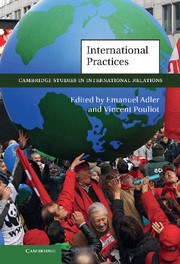Book contents
- Frontmatter
- Contents
- Figure
- Note on the contributors
- Acronyms and abbreviations
- Part I Practices in International Relations and social theory
- 1 International practices
- 2 Making sense of “international practices”
- Part II Practices and their background
- Part III The evolution of practices
- Part IV Practices in practice
- Part V Conclusion
- Index
- References
2 - Making sense of “international practices”
from Part I - Practices in International Relations and social theory
Published online by Cambridge University Press: 05 June 2012
- Frontmatter
- Contents
- Figure
- Note on the contributors
- Acronyms and abbreviations
- Part I Practices in International Relations and social theory
- 1 International practices
- 2 Making sense of “international practices”
- Part II Practices and their background
- Part III The evolution of practices
- Part IV Practices in practice
- Part V Conclusion
- Index
- References
Summary
Introduction
Now that the “practice turn” in social theory has reached International Relations (IR), a new great debate seems to be in the offing. Observers of previous “turns” might be skeptical of the promissory notes, not only because of experience, but also because this new focus on “practices” seems even less well defined. The spectrum ranges from adherents of “implicit knowledge” and habits à la Polanyi to Giddean grand theory focusing on the dialectics of agency and structure. It encompasses “social” epistemology stressing the communal aspects of knowledge production, Bourdieu’s emphasis on “habitus” and doxa, and Oakeshott’s “habits” and “knowing how” rather than “knowing why.” Thus, the call to foreground practices might make for heated debates but illumination by low wattage, given the heterogeneity of the different vocabularies.
Such problems are usually “solved” by a “working definition” imposing some order. Yet, frequently “working definitions” hide deep conceptual disagreements and emerge from intense negotiations among the participants in a research project. While such a preliminary agreement might be the price for getting along, nothing in this procedure guarantees that this “consensus” is “fruitful,” as it depends on who participates and on who is setting the terms of the debate. Two of the more recent “collective” research programs – one on “ideas,” the other on “judicialization” – illustrate these problems: By nobly forgoing any engagement with the common uses of the crucial terms and their theoretical reflections, and by settling conceptual issues largely by fiat, we were treated to an amicable but rather shallow conversation among friends.
- Type
- Chapter
- Information
- International Practices , pp. 36 - 60Publisher: Cambridge University PressPrint publication year: 2011
References
- 41
- Cited by

